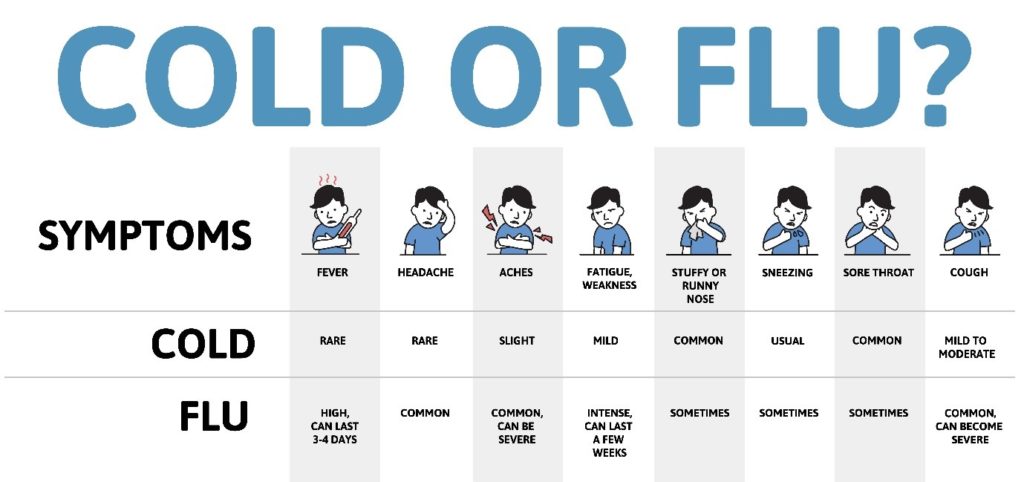Who is more at risk of getting the flu and when should you see a doctor?
6th December 2019
Influenza, otherwise known as the flu, is a virus that affects the nose, throat and lungs. The flu is often confused with the common cold however, the flu can be much more dangerous than a cold if it develops into secondary infections or results in serious complications. If not treated effectively, the flu can result in life-threatening consequences.
Who is at high risk of catching the flu?
Certain groups of people are more at risk of catching the flu and developing serious complications. Although it is recommended that everyone gets vaccinated to protect themselves against the flu, it is very important that these high-risk groups get the flu vaccine. These groups consist of:
Children – those aged 5 and under are more likely to develop health complications from the flu virus as their immune system isn’t fully developed. Children aged 2+ are eligible for the flu vaccine from the NHS and those under 2 who are at higher risk from flu may be eligible. Talk to your GP.
Adults aged 65 and over – older adults are at greater risk for serious complications from the flu because as you get older your immune system weakens. The flu can also worsen long-term health conditions such as asthma, lung disease and heart disease.
Pregnant women – women who are pregnant or have recently had a baby are more susceptible to illnesses because of the changes their bodies go through during pregnancy. Serious complications from the flu can include birth defects in the baby, pneumonia and increased risk of having a miscarriage or premature labour.

People with weakened immune systems – Those who have weakened immune systems have an increased risk of serious complications from the flu because they are less able to fight off infection. These can be people with HIV, AIDS and those receiving chemotherapy.
Those with underlying health conditions – these include asthma, diabetes, heart disease, lung disease, kidney disease, liver disease and those with chronic neurological conditions.
People who work in heavily populated places – these include hospitals, schools, childcare facilities, offices and nursing homes.
Those at high risk should get the flu vaccine as soon as possible. You need to get vaccinated every year as the virus strains change from flu season to flu season, so in order to remain protected you need an annual vaccination. Even if you think you have had the flu already this season, you should still get vaccinated. The flu is caused by several viruses so the immunity you naturally developed would only protect you against one of them, meaning you can still go on to catch another strain. Those who live with or who are regularly around people at high risk of obtaining the flu should also get vaccinated, to prevent possibly passing it on to them.
Symptoms

You may be thinking, how do I know if I have the flu or not? Many people confuse the flu with a cold, but the flu tends to have more severe symptoms and comes on a lot quicker than the common cold. Symptoms of the flu include:
- A blocked or runny nose
- Sneezing
- A sore throat
- A high temperature of 38˚C and above
- A headache
- Tiredness and weakness
- A dry, chesty cough
- General aches and pains
- Nausea or vomiting
- Loss of appetite
- The chills
- Difficulty sleeping
The flu can be debilitating, it often leaves you feeling so exhausted and unwell that you need to stay in bed to recover. Usually it can be treated with over the counter medications like cold and flu tablets, cough syrups and lozenges as well as getting plenty of rest and drinking a lot of fluids. In an otherwise healthy person, the flu will usually clear up on its own within a week or two.
When to see a doctor

Usually you won’t have to see a doctor because of the flu as it tends to clear up on its own. Many people go to the doctor with the flu expecting antibiotics, but the flu can not be treated with antibiotics, as it is a virus. The NHS advise if you have the flu you should consider seeing your GP if:
- You’re 65 years of age or older
- You’re pregnant
- You have a long-term medical condition
- You have a weakened immune system
- You develop chest pain, shortness of breath, difficulty breathing or start coughing up blood
- Your symptoms are getting worse over time or haven’t improved in a week
If any of these apply to you, you may need medications such as an antiviral to help you treat or prevent complications from the flu.
How can Kays Medical help?

Kays Medical can provide flu vaccinations to businesses and organisations to prevent the mass spread of influenza. The flu vaccine is the best line of defence we have against the flu virus and is the most effective way of ensuring you do not get sick. Those who are at high risk of getting the flu or developing complications should get the flu vaccine as soon as possible. If you or anyone in your workplace falls under these groups, or is regularly around people in these groups you should consider vaccinations for your work force to help keep them safe. Contact us to find out more about workplace flu vaccinations or to arrange for a member of our team to visit your site to administer vaccines to your workforce.
















